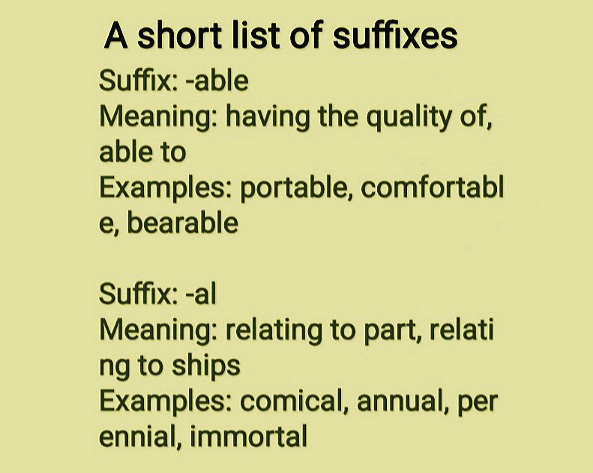How To Use The Most Common Prefixes And Suffixes

The most common use of prefixes and suffixes, Do you ever feel confused? Most people are familiar with this common adjective; They can easily answer the question. The adjective disorientation is less common in everyday speech. Chaotic and confused carry the same meaning, but to some people the directions may be less familiar. People who learn English are often intimidated when they encounter scary vocabulary. Whether your mother tongue is English and you are just learning it, you can benefit from a brief study of prefixes and suffixes, collectively known as affixes. These small language building blocks can help you decode any challenging word. Let's start with the isolated word prefix!
What is A Prefix?
A prefix is a group of letters that we add to the beginning of a word to create a new word with a different meaning. Symptoms For example, the prefix can create a new word as opposed to the meaning of the word being added. The list below shows the common symptoms in English that you should know.When you add a prefix to/ with a word, you should not change the spelling of your original word or prefix. The words disappear (a combination of dissatisfied and present), dissatisfied and undone all illustrate this guideline. Follow even spelling double consonants such as: misspelled, unchanged, and collaboration words.
You should use a hyphen when joining prefixes such as pronouns in American pronouns. There should always be a hyphen after the sub-self- (as self-respect) and after the prefix-when it means ex (as ex-husband). Hyphenes can prevent misreading, misinterpretation or confusion with other words. For example, recovery should be hyphenated (to re-cover) to avoid being confused with recovery (to restore or repair).
Some Common Prefixes
Some of the common English prefixes are dis-in, in- and un- which make the word negative.Another common symptom, again, indicates recurrence. For example, reconnecting with the word build means "recreating".
Other symptoms may indicate location: sub (below or below meaning) is found in common terms such as subway and submarine. Supra- (meaning above) is often seen in medical terms such as the supraclavicular nerve that lies above the veins and bones.
Tired of embarrassing types? Let the grammar coach do the heavy lifting, and solve your writing for free! Get started now!

A Short List of Prefixes
Prefix: de-Meaning: down, from, away, opposite, reverse
Examples: decrease, decode, decrement
Prefix: dis-
Meaning: opposite, not, reverse, away
Examples: disappear, disagree, discord
Prefix: ex-
Meaning: out of, lacking, away from, former
Examples: explosion, exhale, execrate
Prefix: il-
Meaning: not, nay, none
Examples: illogical, illegal, Illinois, Illegitimate
Prefix: im-
Meaning: without, not, nope
Example: improper, impossible, implausible
Prefix: in-
Meaning: not, nope, never
Examples: invisible, without inaction, Indiscernible
Prefix: mis-
Meaning: wrong, bad, improper
Examples: misplace, misstep, mislead, mistake
Prefix: non-
Meaning: not, none, nay
Examples: nonsense, nonfiction, noncommercial
Prefix: pre-
Meaning: before, at first, era
Examples: prehistory, prefix, predestine
Prefix: pro-
Meaning: forward, for, before, earlier
Examples: profess, proactive, program, project
Prefix: re-
Meaning: back, again, afresh
Examples: reappear, react, ready, respond
Prefix: un-
Meaning: not, against, opposite
Examples: unequal, undo, unusual, uneven
What is A Suffix
A suffix is a group of letters to create a new word at the end of a word. In this article, you will find a list of suffixes with meanings and examples in English.When you add a suffix to/ with a word, the original word usually retains its original spelling. There are, however, some exceptions to this rule: if the original word is a pronunciation and ends in a single consonant, double the last letter. For example, the tip becomes tipping or tips and the run becomes running. If the word ends in more than one consonant like bank, the last letter will not be doubled.
Some Common Suffixes
Some common suffixes are in the -d, -o, and-method. Convincing changes the activity from the past tense. In the sentence "Sandy has thrown the snow", the transliteration suffix dwarfs the past tense of the verb. The double-suffix verb occurs as it appears in the following sentence: "Sandy is throwing snow."The suffix is usually added to a verb adjective (a word that describes verbs, verb adjectives or other verbs). Examples of bi-suffix suffixes include cheerfully, quickly and loudly. Childhood, suffixes and words like lamps and chairs are plural.

A Short List of Suffixes
Suffix: -ableMeaning: having the quality of, able to
Examples: portable, comfortable, bearable
Suffix: -al
Meaning: relating to part, relating to ships
Examples: comical, annual, perennial, immortal
Suffix: -er
Meaning: comparative, relative, correlative
Examples: stronger, bigger, master, premier
Suffix: -est
Meaning: superlative, maximum, supreme
Examples: tiniest, strongest, biggest, highest
Suffix: -ful
Meaning: of, full, over, up, athwart
Examples: grateful, beautiful, delightful, thankful
Suffix: -ible
Meaning: forming an adjective
Examples: terrible, reversible, horrible
Suffix: -ily
Meaning: forming an adverb
Examples: happily, gaily, merrily
Suffix: -ing
Meaning: a gerund, denoting an action, or a material
Examples: acting, showing, starring, displaying
Suffix: -less
Meaning: not affected by, without, outside
Examples: tireless, friendless, fadeless
Suffix: -ly
Meaning: forming an adjective
Examples: hourly, clearly, frequently, neatly
Suffix: -ness
Meaning: condition or denoting a state
Examples: wilderness, kindness, greatness
Suffix: -y
Meaning: full of, denoting a condition
Examples: messy, glory, victory, vanity, vainglory
It's Your Turn
The more individual suffixes and prefixes you use in English, the more you will use it, so try to read and practice as extensively as possible! Look for them in your daily activities and see what key words you can spot or capture in each instance.English Prefixes And Suffixes (FAQs)
What is the English Prefixes And Suffixes?Answer: Prefixes and suffixes are sets of letters that are added to the beginning and end of other words. They are not words on their own and cannot stand on their own in a sentence. If they are printed on their own, they have a hyphen before and after them.
What are prefixes?
Answer: A prefix is a group of letters that is placed before the root of a word and can change the meaning of the word. For example; The word "disclosure" consists of the prefix "dis-" with the root word "close" and the word "disclosure" means "not to close or disclose".
What are suffixes?
Answer: A suffix is a group of letters placed after the root word of a word. For example, the word comfortable consists of the root word "comfort" combined with the suffix "-sadhya".
Which exams include Prefixes and Suffixes in their syllabus?
Answer: Prefixes and suffixes are often asked in general English section of various competitive exams like banking exam, SSC, CDS, RRB and defense exam.
How to use English Grammar Prefix and Suffix?
Answer: We need to be careful how we use them. We can be confused by many words, like the word 'irrational' but with confusion, people can use it as 'irrational' or 'irrational', which is wrong. Therefore, we should be sure to use it properly while using it. Before using any word we must know the meaning of the word and the use of its prefix or suffix.

No comments:
Post a Comment